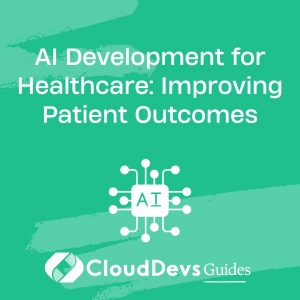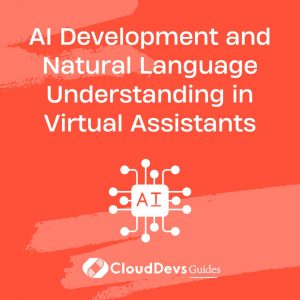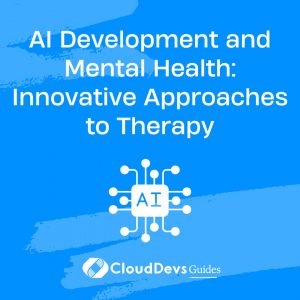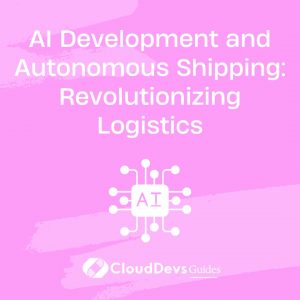AI Development for Healthcare: Improving Patient Outcomes
In recent years, the integration of Artificial Intelligence (AI) into the healthcare sector has sparked a revolution that promises to significantly improve patient outcomes. With its ability to analyze vast amounts of data, identify patterns, and make predictions, AI is transforming the way medical professionals diagnose, treat, and manage various conditions. In this blog, we will delve into the exciting advancements in AI development for healthcare and explore how they are contributing to better patient outcomes.
1. The Promise of AI in Healthcare
1.1. Enhanced Diagnostic Accuracy
One of the most promising applications of AI in healthcare is its role in enhancing diagnostic accuracy. Traditional diagnostic methods often rely on human interpretation of medical images and tests, which can be prone to errors. AI, on the other hand, excels in image recognition and pattern detection. For instance, AI algorithms trained on large datasets of medical images can quickly and accurately identify anomalies that might be missed by the human eye. This capability significantly improves the chances of early and accurate diagnosis, leading to better treatment outcomes.
python
# Example of using a convolutional neural network (CNN) for medical image classification
import tensorflow as tf
# Load pre-trained CNN model
model = tf.keras.applications.ResNet50(weights='imagenet')
# Load and preprocess medical image
image = tf.keras.preprocessing.image.load_img('medical_image.jpg', target_size=(224, 224))
image_array = tf.keras.preprocessing.image.img_to_array(image)
image_array = tf.keras.applications.resnet50.preprocess_input(image_array)
image_array = tf.expand_dims(image_array, axis=0)
# Make predictions
predictions = model.predict(image_array)
decoded_predictions = tf.keras.applications.resnet50.decode_predictions(predictions)
print(decoded_predictions)
1.2. Personalized Treatment Plans
AI’s ability to process and analyze vast amounts of patient data quickly opens the door to personalized treatment plans. By considering an individual’s medical history, genetic makeup, and response to various interventions, AI algorithms can recommend treatments that are tailored to the patient’s specific needs. This not only improves the effectiveness of the treatment but also reduces the likelihood of adverse reactions.
python
# Example of using AI to generate personalized treatment recommendations
patient_data = {
'age': 45,
'genetic_markers': ['marker1', 'marker2', 'marker3'],
'medical_history': ['hypertension', 'diabetes'],
'current_medications': ['medicationA', 'medicationB']
}
# AI algorithm processes patient data and suggests personalized treatment plan
personalized_treatment = ai_algorithm.generate_treatment_recommendation(patient_data)
print(personalized_treatment)
2. Applications of AI in Healthcare
2.1. Drug Discovery and Development
AI is revolutionizing the process of drug discovery by significantly speeding up the identification of potential drug candidates. Traditional drug discovery methods are time-consuming and costly, often involving trial and error. AI algorithms can analyze molecular structures, predict the interactions between compounds and biological targets, and even simulate the effects of drugs on the human body. This expedites the identification of promising compounds, ultimately leading to faster development of new treatments.
python
# Example of using AI for drug discovery
def predict_binding_affinity(compound, target_protein):
# AI model predicts the binding affinity between the compound and the target protein
predicted_affinity = ai_model.predict(compound, target_protein)
return predicted_affinity
compound = 'example_compound'
target_protein = 'target_protein'
predicted_affinity = predict_binding_affinity(compound, target_protein)
print(f'Predicted binding affinity: {predicted_affinity}')
2.2. Health Monitoring and Early Detection
Wearable devices and IoT sensors equipped with AI capabilities are changing the landscape of health monitoring. These devices can continuously collect and analyze data such as heart rate, blood pressure, and even sleep patterns. AI algorithms can identify deviations from normal patterns and raise alerts in case of potential health issues. This early detection enables prompt medical intervention, preventing the progression of diseases and improving patient outcomes.
python
# Example of using AI-powered wearable device for health monitoring
def analyze_heart_rate_data(heart_rate_data):
# AI algorithm analyzes heart rate data for anomalies
if any(abnormality_detected):
alert_user('Potential irregularity in heart rate detected.')
heart_rate_data = [65, 67, 70, 72, 120, 122, 125, 128]
analyze_heart_rate_data(heart_rate_data)
3. Benefits and Challenges
3.1. Benefits of AI in Healthcare
- Speed and Efficiency: AI can process and analyze data much faster than humans, leading to quicker diagnoses and treatment decisions.
- Accuracy: AI algorithms are less prone to human errors, leading to more accurate diagnoses and predictions.
- Personalization: Tailored treatment plans based on individual patient data improve treatment effectiveness.
- Data-driven Insights: AI can uncover patterns and insights from large datasets that humans might overlook.
3.2. Challenges of AI in Healthcare
- Data Privacy and Security: Handling sensitive patient data requires robust security measures to prevent breaches.
- Ethical Considerations: AI algorithms can inadvertently perpetuate biases present in training data.
- Regulatory Hurdles: Adhering to regulatory standards and obtaining approvals for AI-driven medical solutions can be complex.
3.3. Future Directions
The integration of AI in healthcare holds immense potential for improving patient outcomes. As technology continues to evolve, we can expect even more sophisticated AI applications that redefine medical practices. From AI-driven robotic surgeries to predictive healthcare analytics, the possibilities are vast.
However, it’s important to approach the adoption of AI in healthcare with caution. Ethical considerations, data privacy, and regulatory compliance should always be at the forefront of development efforts. Striking a balance between innovation and responsible implementation is crucial to ensuring that AI truly enhances patient outcomes without compromising on safety and privacy.
Conclusion
In conclusion, the synergy between AI and healthcare is transforming the way medical professionals approach diagnostics, treatment, and patient care. With its ability to enhance diagnostic accuracy, offer personalized treatment plans, and revolutionize drug discovery, AI is a formidable tool in the quest to improve patient outcomes. As we continue to navigate the challenges and opportunities that AI presents, the future of healthcare looks brighter and more promising than ever before.
Table of Contents









